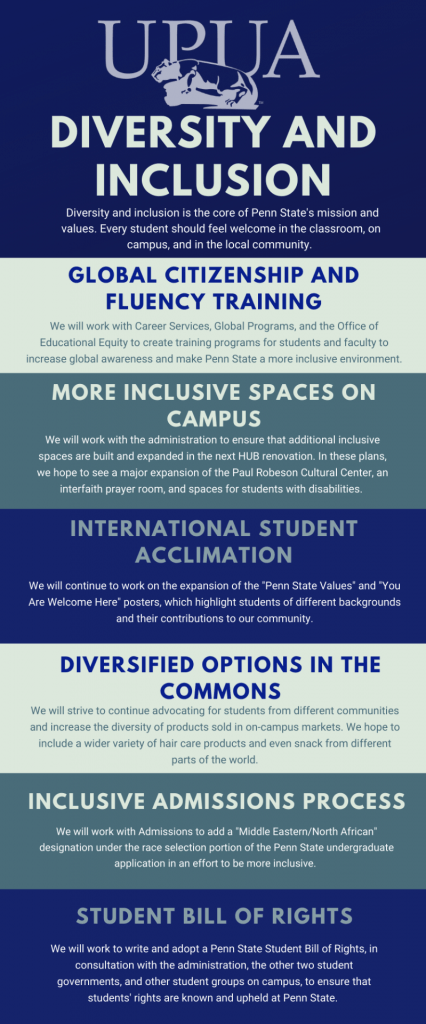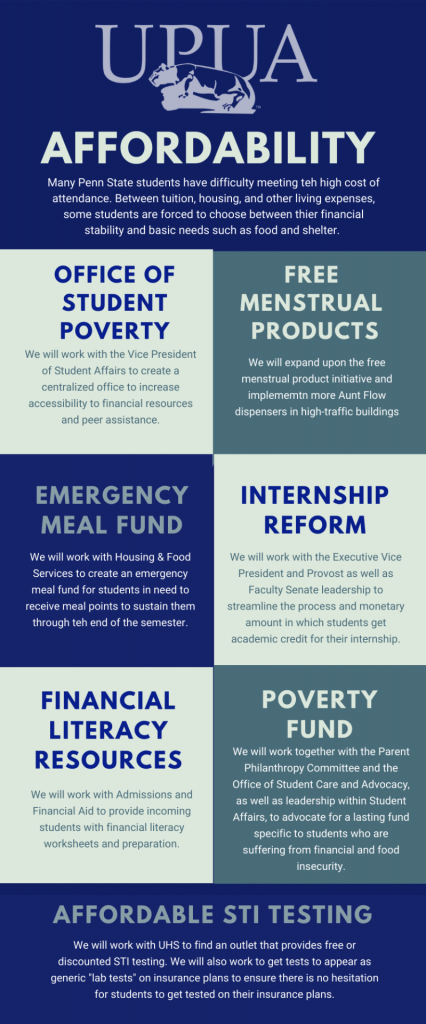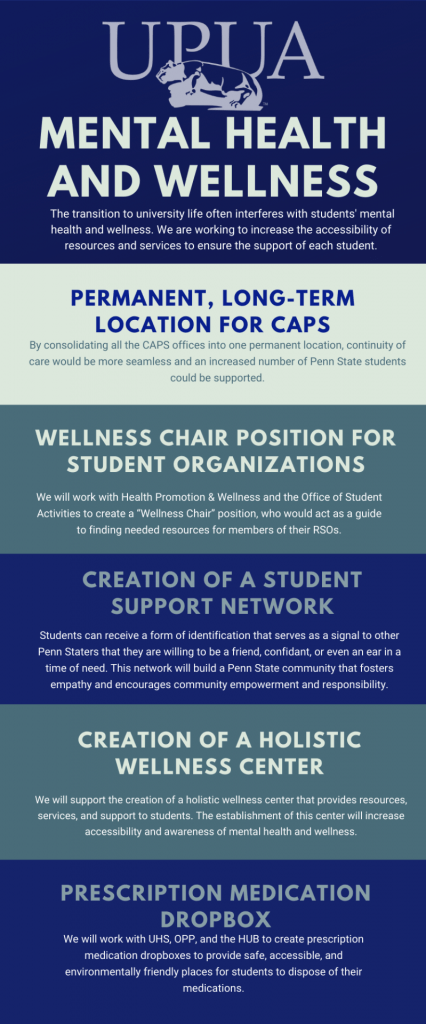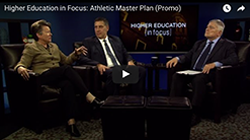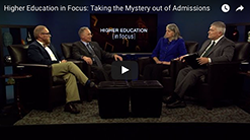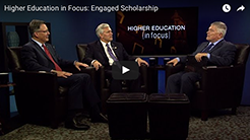by Dr. Eric Barron | May 7, 2020 | Uncategorized
Please join us for a series of livestream sessions to answer your questions.
We know, of course, the coronavirus has changed the world and created a great deal of concern and anxiety, whether financial or safety related, as well as wondering how it may impact your educational opportunities and experiences. No one has seen this before, and it has raised many questions.
Penn State’s renowned educational model, built over time, has enabled us to rise to this challenge, and we are well-prepared to address your individual needs now, and in the future. Our in-class, engaged and virtual learning models — both remote and online are innovative and flexible, and we are ready for you to join us. We will meet you where you are to make your education accessible, safe and financially achievable. And, as you prepare for your degree experience, our faculty, administration, staff and alumni community will set you up for a lifetime of success with the learning and skills you need to reach your career and life potential, and to impact the world.
To help convey this information, we have established a series of four virtual programs: “Welcome to the Penn State Community.” I want to personally invite you to join one, or all, of the four livestream Q&A sessions with students, alumni, faculty and members of Penn State’s leadership team — all of whom will join us via Zoom from across the great Commonwealth to answer your questions and help welcome you to Penn State.
Please join us at Classof2024.psu.edu at 3:30 p.m. EDT based on the schedule below. I hope you will submit questions in advance using an anonymous form at Classof2024.psu.edu so we can address them during our live sessions.
- May 14: Flexibility to Meet Individual Needs, which I am thrilled to host
- May 18: The Penn State Student Experience, hosted by Damon Sims, vice president for Student Affairs
- May 20: Strength of the Penn State Community, hosted by Marie Hardin, dean of the Donald P. Bellisario College of Communications
- May 27: Value of a Penn State Education, which I am also excited to host
These sessions will explore the many ways our leading educational, financial and support systems are able to help you and all of our students continue to excel as you achieve your ambitions and dreams — it is no accident that Penn State is ranked second in the nation for producing CEOs. With unparalleled technology support, digital and curriculum innovation, a flexible structure including our Commonwealth and University Park campuses, effective outreach programming, and a wide array of top-ranked academic programs, Penn State is uniquely prepared for the arrival of the Class of 2024. These sessions may also provide valuable information for those of you who may be transferring to our great University or entering our graduate programs.
I’d like to elaborate on our ability to flexibly meet the needs of newly admitted students. Some of this will be touched upon in the series but warrants elaboration.
While we remain optimistic that classes will begin on our campuses this fall, it’s possible that we may need a hybrid structure, and our institution is equipped to handle such scenarios with agility and excellence. We have the tools and commitment to personalize your education, in the classroom and virtually, and with a combination of both. We are already recognized leaders in evolving education, and we can draw on the expertise of Penn State’s World Campus, which began in 1998 and is consistently among U.S. News and World Report’s highest-ranked online programs. With this experience, we have developed skill sets and hired personnel that have transformed the traditional classroom, enabled flexibility for every student, and has allowed us to be more nimble, more engaged, and to deliver an exceptional remote education even in the face of crisis.
As you look forward to the Penn State education you have worked so hard to begin, we realize you may need further flexibility and support. Always remember that we are ready to work with you using resources that include:
- options for hybrid, flexible customization of course schedules;
- virtual (online or remotely delivered) summer session courses to get you started early with a chance to “dip your toes” into college courses;
- broadband access with internet/computers/technology support;
- disability services; and
- financial aid and literacy counseling services.
Penn State has also introduced Flex Start. This option gives students maximum flexibility to begin their education closer to home or elsewhere, and then seamlessly complete their degree at their admitted campus location.
Another way Penn State is supporting families is through our commitment to freeze tuition for the next academic year. Our goal is to keep a Penn State education affordable for working families, and a tuition freeze is just one of the ways we are working toward that end.
I want to emphasize that when you join Penn State you are joining a community that is committed to your success. As we equip you to build an exciting future and realize your potential, the Penn State alumni community will be there to help you and cheer you on! We have the largest and most active alumni network in the country, renowned for the ways in which alumni help one another as mentors, career coaches, employers and much more. Wherever you go, if you say, “I go to Penn State,” you are likely to find another proud Penn Stater. So, you have a great deal to look forward to.
Finally, though we have been faced with great challenges this year, I hope you are heartened by the successes seen this spring: You are graduating from high school, 90,000+ Penn State students successfully finished the semester, and more than 14,000 are about to be minted Penn State alumni. I hope you will join us and be part of this community that is helping to shape the world and our future. I look forward to welcoming you to Penn State in person and to watching you thrive.
We Are Penn State, and you are going to love it here!
by Dr. Eric Barron | Apr 6, 2020 | Uncategorized
At the end of last semester, I wrote about the rise of empathy among Penn State students, wondering if this is “a pivotal moment in turbulent times.” I had no idea of the turbulent times that would be upon us a few short months after I typed those words … or how our community’s empathy would be tested.
As COVID-19 cases mount in the United States, stress is an inevitable side effect. This pandemic has not surprisingly led to deep concerns and general anxiety, and it also has spawned misconceptions fueled in part by misinformation or fear. As the new coronavirus spreads around the world, so unfortunately do cases of xenophobia or discrimination against individuals of Asian descent.
As members of a community of learners, teachers and scholars, we have a responsibility to tap into expertise and knowledge at our disposal to avoid not only falling prey to these biases, but to actively address these ugly prejudices that have no basis in fact. Racial discrimination and unequal treatment of any population is unacceptable and offensive to everyone in our community who cherishes diversity and inclusion. The University offers many resources for those who need support during these uncertain times, including assistance from our Penn State Global Programs staff, who can answer questions about international student and scholar advising at 814-865-6348, and inquiries related to student engagement and intercultural learning at 814-867-6101.
At Penn State, the presence of an international population or racially diverse domestic population is a gift that we welcome. I personally would like these individuals to know that their talents, knowledge, differences and cultures are a tremendous benefit to our community and to our campuses across the commonwealth.
We truly are one community, and we are in this together. Caring for each other, albeit remotely, is the only way we can move forward as one. Please remember that many in the Penn State family are dealing with the additional anxiety that results from family members in the epicenter of outbreaks around the world, including the United States. My daughter, son-in-law and darling granddaughter live in New York City. Every day Molly and I read the headlines with dread. But we operate with the unshakable belief that we will get through this, and as a united community we will emerge stronger.
I am also encouraged by the Penn Staters who have stepped up to be part of the solution. Penn State’s student leaders gathered to discuss how to “flatten the curve” of this virus and protect our vulnerable residents by encouraging fellow students to practice social distancing. Alumni are contributing their company’s resources to fight COVID-19, and they are continuing to network with students who will be entering the job market. As you know, Penn Staters are across the globe, and the Shanghai Chapter of the Penn State Alumni Association is collecting masks to send to the U.S. in this time of critical need. And our faculty and staff continue to do what they do best — keeping business operations functioning, teaching, conducting research and serving humankind.
I ask that, in addition to caring for others, please remember to care for yourselves. Challenging times like these are times when we need to care for ourselves the most. I understand that days of sitting in the same room looking at the same computer screen are difficult. But they will end, and when they do, let’s emerge as a united community ready to actively participate in the inclusive world all around us.
We are Penn State.
by Dr. Eric Barron | Mar 25, 2020 | Uncategorized
Last week I taught my first class on Zoom, attended my first entirely virtual University Faculty Senate meeting, announced that classes will continue remotely through the semester, and determined, based on CDC recommendations, that graduation will be postponed — sadly another first. These recent weeks have been packed with unfortunate firsts, but also filled with creative solutions, powerful support for one another, and a remarkable sense of unity. The entire Penn State community has shown a level of ‘can-do’ that rivals anything I have ever seen, and I find it incredibly inspiring.
As I mentioned in the town halls, I’m very grateful for the extraordinary efforts of Penn Staters everywhere for continuing our important work of teaching, research and service, while adhering to rapidly changing guidelines for nearly every aspect of our daily lives. I also see an opportunity to engage with Penn Staters in the temporary (I hope) “new normal” remote learning environment and hope we can cultivate community while you’re off campus. Despite the challenging times, I’m heartened by hearing the inspirational anecdotes of Penn Staters coming together in new and amazing ways. We want and need to hear your stories. I encourage you to directly submit stories and shout-outs to https://news.psu.edu/WeAre.
For now, I hope you will join with me in celebrating a few of the ways Penn Staters are helping others.
Student Care and Advocacy
I want to begin by noting the outpouring of support for our students who are under considerable financial stress because of the outbreak of COVID-19. Even as our alumni, faculty and staff face upheaval in their own lives, they have generously given to the Student Care & Advocacy Emergency Fund. Over the past week, 1,200 alumni and friends have made gifts totaling over $115,000 — an inspiring show of support at a time when students urgently need both the funds and the encouragement to persevere. Much more is needed to help our most at-risk students, so please add your support in any way you can.
Personalizing Remote Teaching
Now consider teaching — in what our students call Zoom University. Penn State has long been a pioneer in online education with our World Campus, ranked among the best programs of its kind in the country. This accumulated expertise informed our rapid shift to remote instruction for nearly 100,000 students across all our campuses. Still, as I experienced with my class, quickly pivoting to remote instruction is challenging — especially for some disciplines.
How do we effectively teach a laboratory experiment remotely when faculty are asked not to come to campus? So, Professor Neyda Abreu (DuBois), and colleagues from the Eberly College of Science and the Office of the Vice President for Commonwealth Campuses, without prompting, teamed up to offer a Zoom session on Remote Learning and Labs for all faculty teaching science labs. The session included best practices and creative solutions, as well as breakout sessions by discipline. We Are there to help each other deliver. Planned follow-up sessions on additional topics include exams and academic integrity. The College of Engineering, among others, is also planning similar sessions to help students gain the necessary skills learned in labs.
After hearing from a musical theatre student who believed his semester was lost, I talked to the director, John Simpkins. He said, “We’re scrambling, but we have some ideas that we will start tomorrow!” He added, “Our students are game and they are being awesome.”
In my own class, which met at the normal time, the discussion was rich and thoughtful. But I also heard an interesting comment. I was told that “we get to see each other and make sure we are all okay.”
Penn State Libraries have alerted faculty to valuable resources such as: Academic Video Online, which has a bevy of streaming video resources. This one covers a wide range of subjects and topics, including anthropology, business, counseling, film, health, history, music and more.
And, I have to give a shout out to Barnes & Noble and VitalSource. They are currently offering free access to digital versions of textbooks throughout the remainder of the spring semester. Students can use their school email address to log into VitalSource Bookshelf’s mobile app to access the books. In addition, although the Penn State University Libraries physical locations are closed, the staff is working overtime to provide digital options for students to access their books from home — through E-Reserves and Canvas.
This just scratches the surface of what has been created in less than two weeks.
Serving Our Community
Penn State Housing and Food Services has been supporting the students who remain on the University Park campus with All To Go — a new model for residential dining that provides all to-go food options; there are no cashiers, and everything is prepackaged. Also, along with the Nittany Lion Inn and the Penn Stater, they have donated perishable food items to the Central PA Food Bank and the State College Area School District, which is still providing meals to students in need. They are also donating non-perishables to Lion’s Pantry. Hard not to be proud of a team that, in the midst of an operational challenge, takes the steps to deliver food to the growing number of students and residents with food insecurity.
With the disruption and uncertainty caused by COVID-19, Counseling and Psychological Services (CAPS) continues to be open for business. Students simply need to call to get started. The Student Affairs IT staff outfitted 52 CAPS professionals in a three-day period to work at home, while still adhering to myriad health protocols and privacy standards that are mandated by the state and federal government. It was a Herculean task according to CAPS Senior Director Ben Locke, but an essential one given that last week they supported 200 students, and they expect many more to come.
The Office of Physical Plant has about 200 staff members working on campus across all shifts (24/7) to ensure that utilities are fully operational, providing for essential facility support (emergency repairs, custodial, parts, etc.), and environmental health and safety. These individuals are supporting the systems required to maintain the health of thousands of animals, on campus housing, and of course University Health Services.
Speaking of animals, spring is birthing season in our barns. In the horse barns alone, eight foals have been delivered and they expect another 13. A team of six students and three faculty and staff are caring for all the horses, with the added complexity of foaling season and adhering to human health protocols. Since they are very short staffed, they’re relying on 24/7 remote monitoring of the mares by students and alumni who know the signs of impending delivery. Those monitoring can then alert the on-site students and staff to tend to the animals as needed. Although it’s less than ideal, Brian Egan, assistant teaching professor of equine science, noted it’s the only sustainable way to get through the spring.
Finally, Penn State is working with Mount Nittany Health to turn over a parking garage for drive-up virus testing if the case load becomes difficult to handle. To keep up with rapidly changing recommendations and requirements, Penn State is coordinating with officials from communities across the Commonwealth. We have been in constant contact with emergency managers, health care professionals, experienced community partners, as well as the school district and University officials to exchange information and identify resources as part of our effort to support our communities.
In closing, please know that I’m thinking about all of you — sharing the stress caused by COVID-19 and the struggles related to conducting business in the new remote environment. Eventually this period of social distancing and isolation will pass, and you will again return to your offices, classrooms, labs and studios. Until then, thank you for carrying on the “We Are” sense of community online and in your own homes. Penn State’s community has never been anchored to a particular place — it’s in the heart of every Nittany Lion. Together we will weather this virus and its repercussions, and together we will be a stronger Nittany Nation. Take care of yourselves, your family, friends and neighbors. And remember, we want to hear your stories! In the next few weeks, we will be showcasing Penn Staters coming together in new and amazing ways to overcome the collective challenges faced by our communities, so send your stories to https://news.psu.edu/WeAre. Thank you for all you do!

